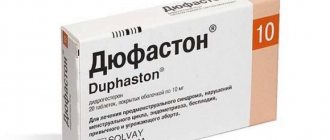Women expecting a baby know very well how important it is to monitor their condition during pregnancy, consulting a doctor at the first signs of illness. Anxiety conditions and, in particular, abdominal pain and unpleasant pulling sensations in the lower back more often appear after active exercise. In this case, we should talk about uterine tone, which in pregnant women can occur up to 6 times during the day. This condition carries a certain danger for the mother and fetus and requires timely elimination.
In many cases, gynecologists prescribe No-shpa for uterine tone. The drug helps relax the uterus. Women are wary of the drug, not knowing whether it can harm the child. When taken correctly, the medicine is harmless and is included in the list of medications prescribed to expectant mothers.
Can I take it if I have uterine tone?
The prescription of No-shpa for uterine hypertonicity is fully justified by leading experts in the field of gynecology. When muscle spasms occur, the drug helps:
- dilation of blood vessels and relieving spasms;
- there is a gradual decrease in the intensity of pain;
- oxygen actively circulates throughout the internal organs.
No-shpa is not dangerous for the expectant mother and the fetus developing inside. It is forbidden to take it on your own. The course of treatment, the required dosage and duration of therapy are prescribed by the doctor.
Related article: symptoms of uterine tone during pregnancy
The principle of action of the drug
Drotaverine is the active ingredient of No-shpa. It helps relieve spasms that occur in the internal organs. Additionally provides analgesic effect. Drotaverine ensures the supply of oxygen to blood vessels.
No-spa is prescribed for the treatment of many diseases. Pregnancy is not a contraindication for its use. The advantage of the drug is the absence of negative effects on the central nervous system (CNS) and the developing fetus.
Given the existing advantages, independent use of No-shpa is strictly prohibited. The course of treatment is prescribed by the gynecologist individually in each case. This minimizes the risk of side effects.
Drotaverine as a medicine
Drotaverine is a synthetic drug that is used to combat spasms and pain. This medication improves blood circulation in the blood vessels, which has a beneficial effect on the condition of the smooth muscles of the following organs:
- gastrointestinal tract;
- genitourinary system;
- of cardio-vascular system.
The drug has no effect on the central nervous system. But it is worth noting that Drotaverine is not on the list of safe drugs according to the international register.
On pharmacy shelves Drotaverine can be found in the form:
- small round light yellow tablets - 40 mg;
- solution for intramuscular administration - 2 ml in an ampoule.
Drotaverine is an effective pain reliever.
The active substance of the drug is drotaverine hydrochloride.
Drotaverine Forte is also produced, the concentration of the active substance in it is twice as high as in regular Drotaverine, that is, 80 mg. Accordingly, the therapeutic effect of its use is much higher.
Drotaverine Forte contains twice as much active ingredient compared to Drotaverine
The wide variety of names for this drug is due to the fact that various pharmaceutical companies are involved in its production. So, on the shelves of pharmacies you can find: Vero-Drotaverine, Drotaverine-Darnitsa, Drotaverine FPO, Drotaverine UBF, Drotaverine - Ellara.
Possibility of using the drug while pregnant
According to the instructions, the use of Drotaverine by pregnant women is allowed, but with caution and only after consultation with a doctor. This is primarily due to the fact that scientific research has not been conducted to identify negative consequences on a developing baby. And also do not forget that the medication penetrates the placental barrier. But experiments on animals rejected the theory of toxic effects on the fetus.
In European countries, Drotaverine is not used. But they have a drug similar in composition - Duspatalin. This medication is successfully used in practice, including in the treatment of pregnant women.
When my three-year-old daughter has severe coughing attacks, especially at night, I use a quarter of a No-shpa tablet along with half of Fenkarol. The effect of such treatment is achieved almost immediately. Naturally, these drugs do not cure the cough itself, but they eliminate the spasm. This method of treatment was suggested to me by emergency doctors. True, No-shpa is not always in my medicine cabinet, but I buy Drotaverine all the time. Therefore, sometimes instead of No-shpa I give its analogue. I myself often use Drotaverine for painful menstruation and ovulation. I cannot say that I consider this drug a panacea and it copes with my painful sensations with a bang. But whatever reduces the pain at least a little is a fact. Moreover, I am satisfied with its price category, which is significantly lower than other antispasmodics. By the way, Drotaverine costs around 90 Russian rubles for 100 pieces, while the same amount of No-shpa costs 230 rubles.
Indications and contraindications
Smooth muscle spasm is the main indication for prescribing No-shpa. The active substance of the drug actively relieves pain in the abdomen, against which other antispasmodics are powerless. The main indications for taking No-shpa include:
- hepatic colic;
- renal, intestinal colic;
- disease of the biliary and urinary tract;
- cholecystitis in acute and chronic forms;
- hypertonicity of the uterus during pregnancy;
- spasms in the postoperative period;
- peptic ulcer;
- spasms of cerebral vessels.
In gynecology, No-shpa is recommended for use not only for uterine tone, but also when there is a threat of miscarriage, to ease contractions.
Although there is a large list of indications, the drug also has a number of contraindications that you should be aware of before starting treatment.
- Individual intolerance to individual components of the drug.
- Kidney, liver failure.
- Heart failure.
- In individual cases, the period of breastfeeding is a contraindication to the use of No-shpa.
- Taking the product is prohibited for children under 6 years of age.
- No-shpu is not prescribed for glaucoma. The active components of the substance can cause an increase in intraocular pressure, which may result in temporary loss of vision.
The doctor should be told about all diseases, this will help eliminate the risk of developing negative consequences of the prescribed treatment.
Analogues of Drotaverine
The modern pharmaceutical market offers a fairly wide selection of analogue medications, which, in terms of the nature of their effect on the body of a pregnant woman, are similar to Drotaverine. The following types of analogues of this drug are distinguished:
- functional, which differ in the active substance, but perform the same functions. These include: Papaverine, Ginipral, Papazole;
- structural, which have the same active component and perform the same functions in the body of a pregnant woman. These include: No-shpu, Spasmol and Spasmonet.
Table: structural and functional analogues of Drotaverine
| Drug name | Release form | Active substance | Indications for use | Possible side effects | Contraindications | Features of use during pregnancy |
| Structural analogues | ||||||
| No-shpa | Pills | Drotaverine hydrochloride |
|
|
| It is not recommended to use the medication during pregnancy. |
| Spasmol | Pills | Drotaverine hydrochloride |
|
|
| The use of the drug is possible only after consultation with a doctor in the last two trimesters of pregnancy. |
| Spasmonet | Pills | Drotaverine hydrochloride |
|
|
| The drug can be used in all trimesters of pregnancy as prescribed by a doctor. |
| Functional analogues | ||||||
| Papaverine |
| Papaverine hydrochloride |
|
|
| The use of papaverine is possible in all trimesters of pregnancy, but only as prescribed by a doctor. |
| Ginipral |
| Hexoprenaline sulfate | Hypertonicity of the uterus in the second and third trimesters of pregnancy. |
|
| Not recommended for use during the first three months of pregnancy. |
| Papazole | Pills. |
|
|
|
| The use of the drug is possible only as prescribed by a doctor, if the benefits of its use are much higher than the potential risks. |
Photo gallery: analogues of Drotaverine
How to take No-shpa correctly
Gynecologists prescribe No-shpa to pregnant women, but completely exclude self-medication. A drug taken in the wrong dosage can cause side effects and threaten a healthy pregnancy.
Up to 60% of expectant mothers experience uterine tone; taking No-shpa will help relax muscles and improve blood circulation. The drug in individual dosage is prescribed in the first trimester. In the first months, the formation of the fetus occurs and it is important that they pass quietly.
You should not take No-shpa in the second trimester. During this period, it may be unsafe for the child and mother. The active components of the drug provoke the opening of the uterus. As a result, a miscarriage may occur.
Repeated use of No-shpa can be prescribed by a doctor in the last stages of gestation in order to prepare the cervix for natural delivery. The medicine helps to soften the cervix and will promote timely dilatation. At the same time, during childbirth the intensity of pain and the risk of a woman experiencing ruptures are significantly reduced.
No-spa at different stages of pregnancy
Taking No-shpa during pregnancy is acceptable at any stage. Despite the fact that in the 1st trimester the formation of the baby’s organs occurs, and there is no placental barrier yet, the first trimester is still not a contraindication for treatment with the drug. On the contrary, the remedy helps prevent miscarriage in the early stages by relieving spasms of the smooth muscles of the uterus.
When there is a threat of miscarriage, a pregnant woman begins to feel a persistent nagging pain in the lower abdomen. The priority measures in this case are:
1. Telephone consultation with a doctor managing the pregnancy. It is very good if you have his phone number, otherwise you should seek help by calling the ambulance service.
In any case, visit your gynecologist as soon as possible.
2. Taking 2 tablets of No-shpa. If you have No-shpa Forte, then take 1 tablet, as the drug is stronger.
The active ingredient of the drug is drotaverine. When it enters the body, the contractile activity of muscle fibers, including the uterus, decreases. She relaxes, hypertension is no longer a threat, and the risk of miscarriage disappears.
In addition, the drug promotes vasodilation, which increases blood supply to the uterus. This improves the supply of oxygen and nutrients to the baby, which only benefits him.
Drotaverine is considered more effective than papaverine, the medicinal effect of which is less pronounced and not so long-lasting.
During the 2nd trimester, the drug should be taken strictly according to indications. Despite the fact that no threat to the fetus has been identified, No-shpa should not be abused. Do not exceed the maximum daily dose or increase the course of treatment without permission.
In the 3rd trimester, you can also take No-shpa without fear for the child’s health. Drotaverine perfectly helps cope with pain during training contractions. When you feel uterine contractions, take 1-2 tablets of No-shpa, and the pain will go away.
If within an hour after taking the No-shpa tablet the contractions ended, then they were training. If their frequency begins to increase, and pain intensifies, then this indicates the beginning of labor. Call an ambulance or go to the maternity hospital yourself.
In the later stages, refrain from taking the medicine. It turns out that when muscles relax during labor, the risk of bleeding increases. Therefore, at 39 weeks of pregnancy, try not to use No-shpa to eliminate spastic pain.
However, the opening of the cervix is often prevented by spasms of the muscles of the uterus itself. Then the use of the drug is justified, but the decision to prescribe it is made only by the doctor. They also determine the dosage and method of administration, most often this is intravenous administration of the drug.
When to take No-shpa?
The drug is used when spasmodic pain occurs. Indications for treatment with the drug are:
- cholecystitis and other diseases of the biliary tract (beyond the acute stage);
- inflammatory diseases of the urinary system (pyelitis, cystitis, urolithiasis and others), accompanied by spasms;
- intestinal colic (regardless of the nature of origin);
- diseases of the digestive system (local ulcers of the duodenum and/or stomach, gastritis, colitis and others);
- spasmodic headache (so-called tension pain).
During pregnancy, No-Spa is usually prescribed for hypertension, because the drug helps relieve tension in the uterus and maintain pregnancy, and it also helps eliminate intestinal spasms and pain in the liver area. But self-medication does not eliminate the need to visit a doctor with a complaint about the occurrence of certain pains.
How does No-shpa affect the fetus?
Drotaverine, which is the active substance of the drug, was administered to pregnant animals to study its effect on the fetus. Studies have shown that it does not have a teratogenic or toxic effect on the baby. Therefore, this medication is widely used in domestic practice for the treatment of pregnant women.
Possible adverse reactions
The advantage of No-shpa is that only 0.01% of those who took the drug experienced side effects. If you follow the recommended dosage of taking the drug, no negative effects occur.
Side effects may include:
- headache;
- dizziness;
- sleep disorders (insomnia);
- tachycardia;
- decreased blood pressure;
- periodic attacks of nausea and vomiting;
- bowel disorder (constipation);
- skin rash (in rare cases, anaphylactic shock);
- If No-Spa is prescribed by injection, swelling is possible at the injection sites.
If one of these conditions occurs, you should consult a doctor immediately. He will replace the drug, stop it or change the dosage. Changing the treatment regimen on your own is strictly prohibited.
Possible analogues
No-shpa has a number of analogues with other drugs that have antispasmodic and analgesic effects. At the same time, independent selection of such funds is strictly prohibited. The active substances of medications with similar compositions have different effects on the body of the mother and the developing fetus.
Among the effective analogues are:
- Drotaverine.
- Biospa.
- Spasmol.
- Spasmonet.
The active substance of all these drugs is drotaverine. Before starting treatment, a doctor's consultation is necessary.
An available analogue is Papaverine. It is contraindicated for people with renal failure and is more often used in surgical practice. Duspatalin and Nispan effectively relieve spasms. Drugs are prescribed to treat intestinal diseases.
Taking No-shpa when uterine tone occurs is completely safe for the health of the mother and the unborn baby, if the treatment is prescribed by a doctor and is carried out under his supervision. It is prohibited to take the drug on your own; this can cause not only side effects, but also provoke the threat of miscarriage.
Reviews from young mothers about the use of Drotaverine during pregnancy
Most young mothers on forums speak positively about the use of Drotaverine and No-shpa during pregnancy. It was these medications, they claim, that doctors prescribed to them for increased tone in the early stages of pregnancy and as a “training” for the cervix before childbirth in later stages. But it is worth noting that most women still prefer No-shpe, as they consider it more purified. Women do not talk about any side effects, much less about the negative impact on the fetus.
Drotaverine is a fairly strong antispasmodic, the use of which is not advisable during pregnancy. But sometimes doctors can prescribe it to an expectant mother when the benefits of its use are much higher than the expected risks. It is prohibited to use the medication without prior consultation with a specialist.










